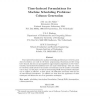Free Online Productivity Tools
i2Speak
i2Symbol
i2OCR
iTex2Img
iWeb2Print
iWeb2Shot
i2Type
iPdf2Split
iPdf2Merge
i2Bopomofo
i2Arabic
i2Style
i2Image
i2PDF
iLatex2Rtf
Sci2ools
114
Voted
INFORMS
2000
2000
Time-Indexed Formulations for Machine Scheduling Problems: Column Generation
Time-indexed formulations for machine scheduling problems have received a great deal of attention; not only do the linear programming relaxations provide strong lower bounds, but they are good guides for approximation algorithms as well. Unfortunately, time-indexed formulations have one major disadvantage: their size. Even for relatively small instances the number of constraints and the number of variables can be large. In this paper, we discuss how Dantzig-Wolfe decomposition techniques can be applied to alleviate, at least partly, the difficulties associated with the size of time-indexed formulations. In addition we show that the application of these techniques still allows the use of cut generation techniques. Key words: scheduling, time-indexed formulation, Dantzig-Wolfe decomposition, column generation March 1996 Revised November 1997 1 The research was carried out while the author was at Eindhoven University of Technology. 2 Supported by NSF Grant DMI-9410102 1
Related Content
| Added | 18 Dec 2010 |
| Updated | 18 Dec 2010 |
| Type | Journal |
| Year | 2000 |
| Where | INFORMS |
| Authors | Marjan van den Akker, Cor A. J. Hurkens, Martin W. P. Savelsbergh |
Comments (0)

